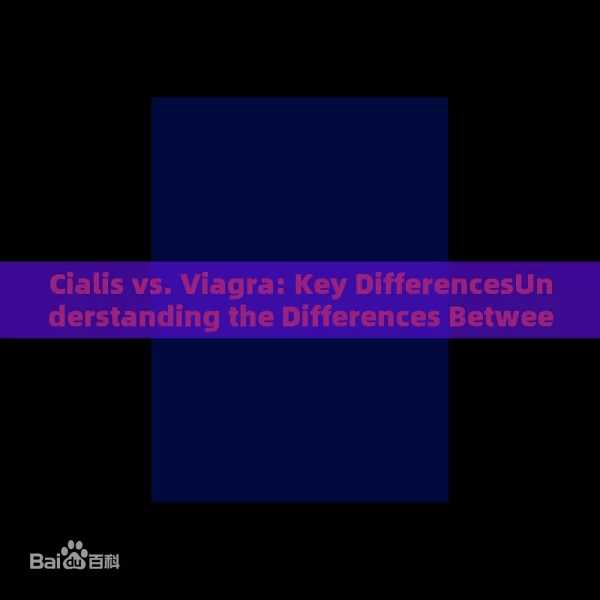Cialis vs. Viagra: Key DifferencesUnderstanding the Differences Between Cialis and Viagra
This article explores the differences between Cialis and Viagra, two popular medications for erectile dysfunction. Understanding these differences is crucial for those seeking effective treatment options. Cialis and Viagra are both PDE5 inhibitors, but they have distinct characteristics. Cialis has a longer duration of action, allowing for more spontaneity in sexual activity. Viagra, on the other hand, acts faster but has a shorter duration. Studies have shown that Cialis may be more suitable for men with certain underlying health conditions. For example, men with diabetes or high blood pressure may respond better to Cialis. Real-life cases illustrate the impact of these differences on individuals' sexual experiences. In conclusion, knowing the differences between Cialis and Viagra can help men make informed decisions about their treatment. It is important to consult a healthcare provider to determine the most appropriate option based on individual needs.
Sexual health is a crucial aspect of overall well-being, and many individuals seek solutions to manage erectile dysfunction (ED). Among the most popular treatments are Cialis and Viagra. Both medications belong to the class of drugs known as phosphodiesterase type 5 inhibitors (PDE5Is), but they have distinct differences that can significantly impact a patient's treatment experience. This article will delve into the key differences between Cialis and Viagra, their mechanisms of action, usage, side effects, and effectiveness, providing a comprehensive guide for those considering these options for managing ED.

Importance of Understanding Cialis and Viagra Differences
Understanding the differences between Cialis and Viagra is essential for individuals seeking effective treatment for erectile dysfunction. Each medication has unique properties that may better suit certain lifestyles, medical histories, or preferences. By comparing these two drugs, patients can make more informed decisions about their sexual health management in consultation with healthcare professionals.
Mechanism of Action
Cialis and Viagra work by increasing blood flow to the penis, which helps achieve and maintain an erection. They do this by inhibiting the enzyme PDE5, which breaks down a chemical messenger called cyclic guanosine monophosphate (cGMP). When cGMP levels are high, blood vessels in the penis relax, allowing more blood to flow in and causing an erection.
While both medications target the same enzyme, they do so with different durations of action. Cialis typically provides a longer-lasting effect, with some studies indicating it can be effective for up to 36 hours. In contrast, Viagra's effects last for about 4 to 6 hours. This difference is crucial for patients who prefer spontaneity in their sexual activities or those who want to plan ahead without worrying about timing.
Usage and Dosage
The recommended starting dose for Cialis is 10 mg taken orally once daily, while Viagra starts at 25 mg, taken as needed approximately 30 minutes to an hour before sexual activity. Both drugs require a prescription from a healthcare provider, who will consider factors such as age, medical history, and severity of ED when determining the appropriate dosage.
It's important to note that exceeding the recommended dose does not necessarily increase effectiveness but may lead to increased side effects. Patients should always follow their doctor's instructions closely and report any adverse reactions immediately.
Side Effects and Tolerability

Both Cialis and Viagra are generally well-tolerated, but they come with potential side effects. Common side effects include headache, facial flushing, nasal congestion, and visual disturbances like blurry vision or changes in color perception. These side effects are usually mild and transient, resolving on their own without additional treatment.
However, there are differences in the frequency and severity of side effects between the two medications. For instance, because Cialis has a longer duration of action, its side effects may persist longer than those associated with Viagra. Additionally, some users report experiencing back pain or muscle aches with Cialis that they do not experience with Viagra.
Patients should discuss any concerns about side effects with their healthcare provider, who can adjust the dosage or switch medications if necessary. It's also worth mentioning that taking either medication with nitrates (used to treat angina) can lead to dangerously low blood pressure; therefore, combining these drugs is strictly contraindicated.
Effectiveness and Patient Satisfaction
Studies have shown that both Cialis and Viagra significantly improve erectile function compared to placebo. However, patient satisfaction varies based on individual preferences and expectations. Some patients prefer the convenience of taking Cialis once daily, knowing they are ready whenever the opportunity arises, while others appreciate the on-demand nature of Viagra.
A study published in the Journal of Sexual Medicine found that men treated with Cialis reported higher rates of successful intercourse and improved overall satisfaction with their sex life compared to those taking Viagra. However, another study in the European Urology journal suggested that patient satisfaction was similar between the two medications when adjusted for factors like relationship quality and communication.
Ultimately, effectiveness and satisfaction depend on personal circumstances and preferences. Healthcare providers should work closely with patients to determine which medication best meets their needs.
Special Considerations
Certain populations may benefit more from one medication over the other due to specific health conditions or lifestyle choices. For example:

1、Men with cardiovascular diseases: Since Cialis has been shown to reduce the risk of heart attack and stroke in some patients, it might be preferred for those with existing cardiovascular issues. However, both medications should be used cautiously in this population under close medical supervision.
2、Older adults: As people age, they may experience changes in drug metabolism and clearance rates. Cialis' longer half-life could be advantageous for older adults who may not need to take medication as frequently. On the other hand, some older adults may prefer the flexibility offered by Viagra's on-demand approach.
3、Religious beliefs or cultural practices: Some religions discourage sexual activity outside of marriage or during certain times of the month (e.g., Ramadan). For these individuals, Cialis' long-lasting effect might pose ethical dilemmas, whereas Viagra's on-demand nature aligns better with their beliefs.
Future Perspectives and Emerging Trends
As research continues in the field of sexual health, new treatments and modalities for managing ED are emerging. One promising area is the development of combination therapies that target multiple pathways involved in achieving and maintaining an erection. Another trend is the exploration of non-invasive therapies, such as vacuum erection devices or shock wave therapy, which offer alternatives to oral medications.
Additionally, personalized medicine approaches aim to tailor treatments based on genetic makeup, lifestyle habits, and comorbidities, potentially improving outcomes and reducing side effects. As these advancements unfold, it remains crucial for healthcare providers to stay informed about the latest evidence and incorporate it into their practice to optimize patient care.
In conclusion, understanding the differences between Cialis and Viagra is vital for selecting the most appropriate treatment for erectile dysfunction. By considering factors like mechanism of action, usage patterns, side effect profiles, effectiveness, and special considerations, patients and healthcare providers can make informed decisions that enhance sexual health and overall quality of life. Future research and innovations hold promise for even more personalized and effective treatments for ED.
comprar Priligy online